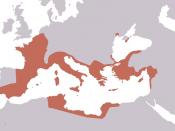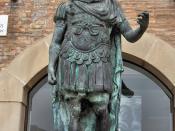"Veni, Vidi, Vici," (I came, I saw, I conquered) were Julius Caesar's famous words after defeating Pharnaces II at Zile. Julius Caesar was a Roman statesman and a fierce general with vision and versatility. His importance in history is obvious, with the hundreds of appearances in stories, plays, and historical texts. Julius Caesar by William Shakespeare emphasizes on the downfall of this historical figure by the hands of conspirators, who themselves become entwined in the complex and violent demise of the possible future king. Shakespeare's tragedy can be derived historically in order to uncover perspectives and influences in both Shakespeare's and Caesar's era.
Shakespeare wrote Julius Caesar in 1599, a time of political worry. The British had enjoyed years of prosperity artistically, politically, and economically under the reign of Queen Elizabeth. She was a strong, yet serene leader that kept Britain free of trouble. Prior to her rule, Britain had been involved in several wars and conflicts such as the War of the Roses, a civil war between Lancaster and York.
By 1599, Queen Elizabeth was 66 years old and heirless. She did not have any children or any other particular heir to the throne after her death. The general public, including Shakespeare, worried that her inevitable death would cause problems in Britain. Shakespeare addressed this notion by writing Julius Caesar. Even though censorship limited direct commentary on political issues, Shakespeare was able to do so in his play. In the story, Julius Caesar died childless and great turmoil took place. A war ensued were Antony attacked Brutus and Claudius with the aid of Octavius and his army. Several people fought to be the new ruler, but Octavius was triumphant. He became the first Roman emperor and a tyrant. Shakespeare's primary source for Julius Caesar was Sir Thomas North's translation...


